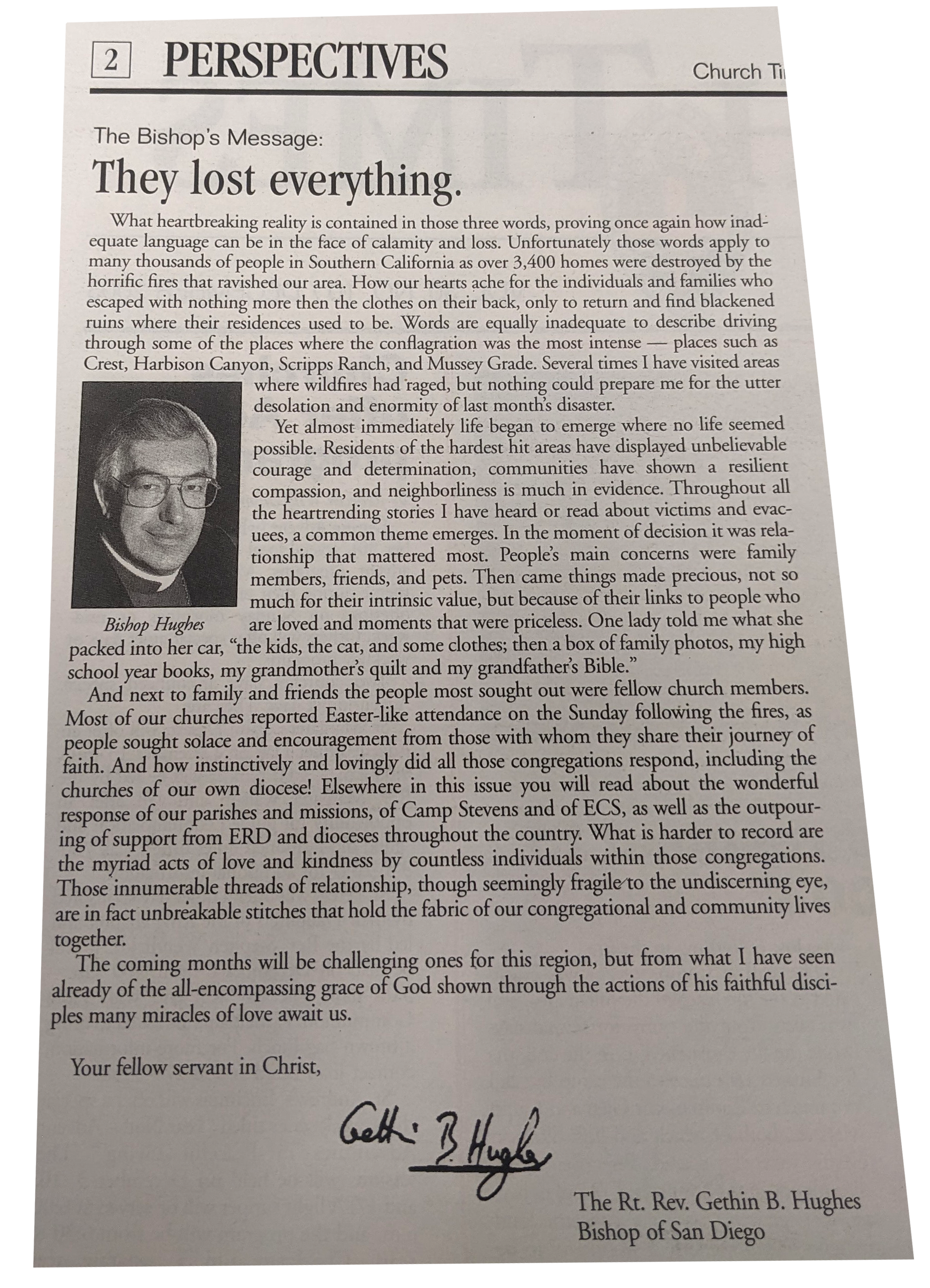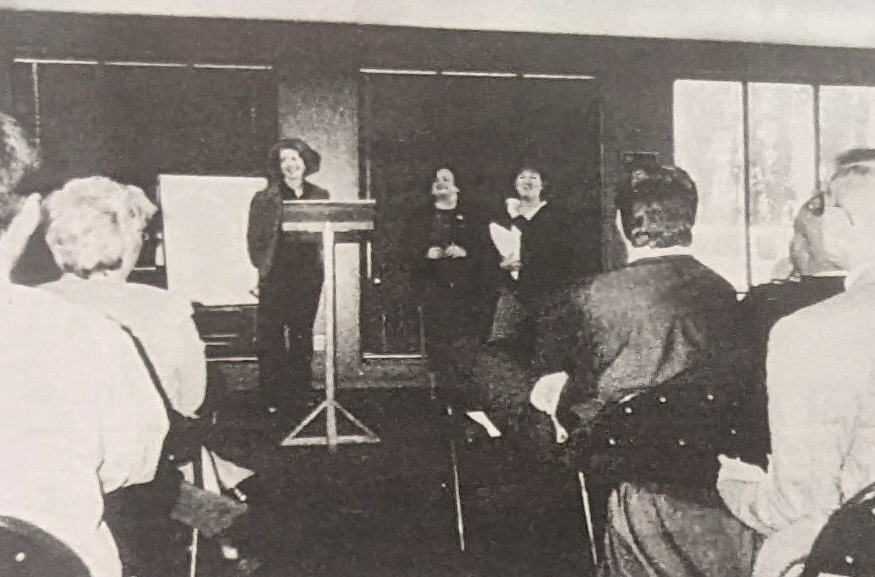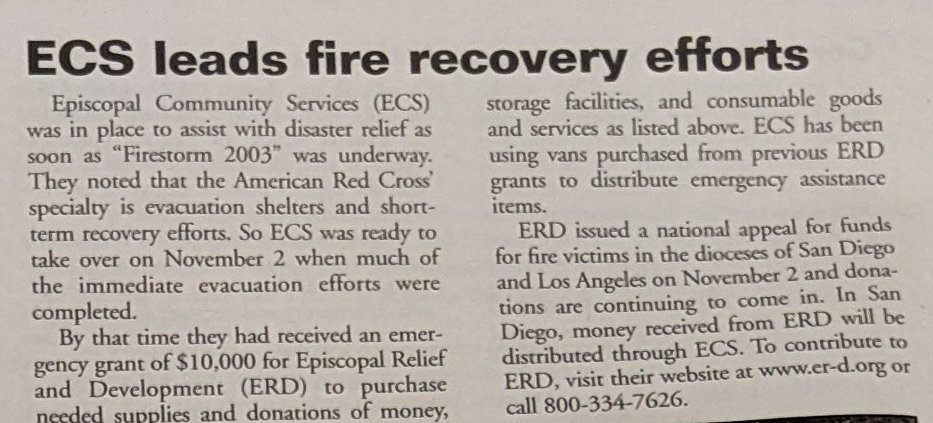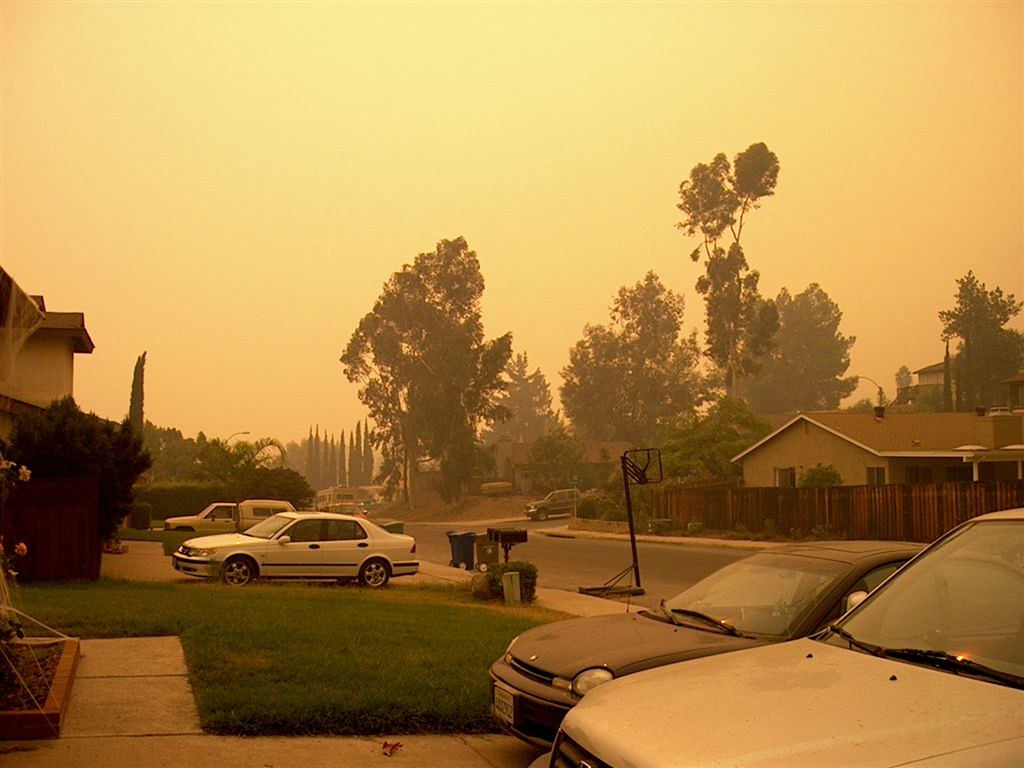Our History: The Cedar Fire
Twenty years ago, in October of 2003, a devastating wildfire ravaged San Diego County. Scorching 687 square miles, destroying 2,232 homes, and tragically claiming the lives of 15 individuals, the Cedar Fire burned for weeks.
A fire the size San Diego had never seen. People lost homes, lives, and loved ones. The picturesque mountain town of Julian found itself besieged by the flames for days.
 St. Mary’s in-the-Valley Episcopal Church in Ramona stepped forward as a beacon of hope–opening its doors and its hearts to those in need. It transformed into an informal evacuation shelter, offering refuge to fire victims who sought solace and support. Parishioners and volunteers rallied to provide essentials like food, clothing, blankets, and other necessities to those who had been forced to flee their homes. The challenges were immense, and the needs were overwhelming. Several of St. Mary’s parishioners offered their RVs as temporary housing for families who had lost everything.
St. Mary’s in-the-Valley Episcopal Church in Ramona stepped forward as a beacon of hope–opening its doors and its hearts to those in need. It transformed into an informal evacuation shelter, offering refuge to fire victims who sought solace and support. Parishioners and volunteers rallied to provide essentials like food, clothing, blankets, and other necessities to those who had been forced to flee their homes. The challenges were immense, and the needs were overwhelming. Several of St. Mary’s parishioners offered their RVs as temporary housing for families who had lost everything.
The Rev. Leland Jones, the vicar of St. Mary’s at that time, became a lifeline for the community. With communication networks disrupted by the fire, he took it upon himself to physically move from house to house, delivering messages and ensuring that those isolated by the disaster were not alone in their plight.
More than 300 homes in the vicinity of Camp Stevens were reduced to ash–the camp opened its doors and provided temporary shelter to families in its cabins.
The Rev. Tony Baron of St. Anne’s in Oceanside emphasized that while immediate needs such as shelter and material support would be addressed by various agencies, it was the spiritual and emotional needs of the survivors that would become apparent in the weeks and months to come. The Church Times reported that he urged his fellow clergy to “Listen, Love, and Pray,” highlighting the importance of these simple but profound acts.
support would be addressed by various agencies, it was the spiritual and emotional needs of the survivors that would become apparent in the weeks and months to come. The Church Times reported that he urged his fellow clergy to “Listen, Love, and Pray,” highlighting the importance of these simple but profound acts.
In the midst of this catastrophic event, EDSD’s response extended far beyond providing traditional relief. Areas where homeless individuals had previously set up camps were also affected by the fire–leading to the loss of what few things they possessed. Because the Red Cross focuses on assisting those who are “displaced but not homeless,” individuals who lost their makeshift homes found themselves without access to emergency evacuation shelters. Recognizing that traditional support systems were missing the mark, Episcopal Community Services (ECS) stepped in to bridge the gap.
 ECS became a lifeline for those left without a clear path forward. The organization distributed food, clothing, phonecards, and provided essential housing and transportation support. In times of crisis, our values and neighborly service shine the brightest, and ECS exemplified these principles throughout its response to the Cedar Fire.
ECS became a lifeline for those left without a clear path forward. The organization distributed food, clothing, phonecards, and provided essential housing and transportation support. In times of crisis, our values and neighborly service shine the brightest, and ECS exemplified these principles throughout its response to the Cedar Fire.
The impact of the Cedar Fire extended to various Episcopal congregations within EDSD. While none of the churches were physically damaged by the fire, they became places of prayer and centers for pastoral care. St. Francis in Pauma Valley, St. Alban’s in El Cajon, St. Barnabas in Borrego Springs, Christ the King in Alpine, St. Timothy’s in San Diego, Camp Stevens in Julian, and St. Bartholomew’s in Poway all felt the effects of the fire. These churches opened their doors to provide solace, support, and a sense of community to those in need.
EDSD’s response to the Cedar Fire of 2003 is a reminder that, in the face of devastation and despair, the Episcopal Diocese of San Diego shows courage, strength, and hope. Through their actions, St. Mary’s, Camp Stevens, ECS, and various congregations within the diocese demonstrated love, compassion, and service to those in deep need. In times of crisis, our collective capacity for love and service knows no bounds.
The Cedar Fire was a tragedy, but it also served as a powerful reminder of the resilience of communities and the boundless love that can emerge when people come together to support one another. It is a lesson that continues to inspire and guide EDSD in its mission to serve its neighbors–embodying the spirit of courageous love in Jesus Christ.
As EDSD prepares for another fire season, it’s important for all of us to take common-sense steps to stay safe and keep our communities safe. Remember the lessons we’ve learned from past wildfires: keep an eye on local fire updates, follow any fire restrictions, clear away brush from our homes, and have a plan. By working together and being proactive, we can reduce the risk of wildfires and keep our neighborhoods secure. Find resources and suggestions on how to prepare for fire here
by
Category: #Communications, #Service
Respond to this:
2 replies to “Our History: The Cedar Fire”
Recent Stories
My mother was ordained an Episcopal priest on January 15, 1994, at All Saints’ Episcopal Church in Beverly Hills. I was ten years old, and her being ordained wasn’t odd […]
In December 2023, I received a letter from Julia Ayala Harris, President of the House of Deputies, saying, “I have reviewed your application and, after prayerful discernment, invite you to […]
When we love something, we share it with our friends and family; like a new show on Netflix or a great restaurant in the neighborhood, we can’t help but share […]






Thanks Chris- great article about the Churches influence in a local crisis! On thr subject of fire prevention, I’ve often thought we could help organize brush removal teams, inviting homeless or unemployed with parishioners to lend a hand, work outside, find funding for compensation and shelter (camping). Wholesome win/win for all. Let me know if you want to explore viability- Peace for the Planet! Peter
Thank you Rev. Chris for everytime I read one of your articles God speaks to me and I am filled with passion again. Peace friar.